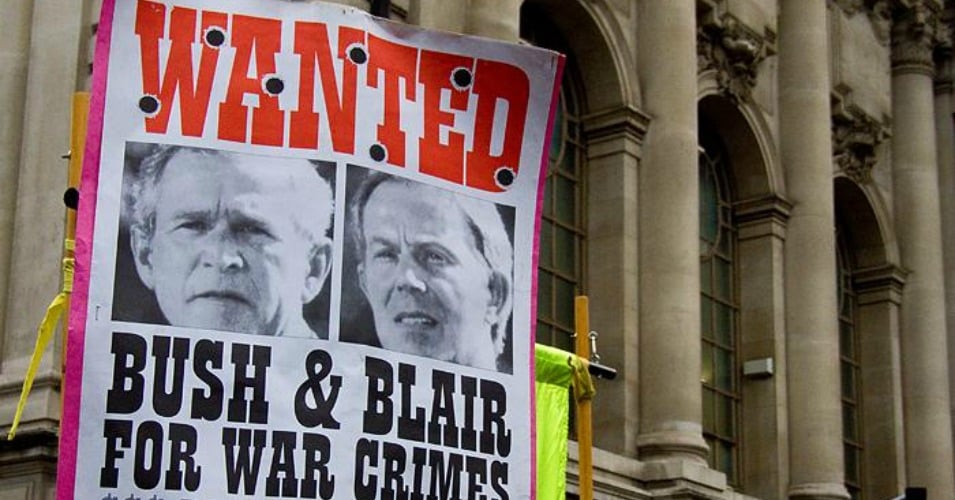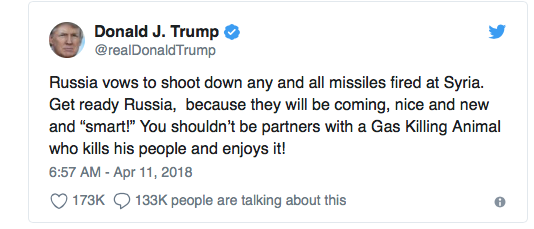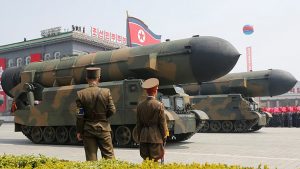“So the story of Douma is thus not just a story of gas – or no gas, as the case may be. It’s about thousands of people who did not opt for evacuation from Douma on buses that left last week, alongside the gunmen with whom they had to live like troglodytes for months in order to survive.” – Robert Fisk (The Independent, April 17, 2018) [1]
LISTEN TO THE SHOW
Click to download the audio (MP3 format)
In the early morning hours of Saturday April 14th Syrian time, the armed forces of the United States, the United Kingdom and France launched airstrikes involving planes and ship launched missiles against three targets in Syria ostensibly with the intention of degrading President Assad’s capacity to use chemical weapons against his own country’s population. The airstrikes came at a time when the Organization for the Prohibition of Chemical Weapons, or OPCW, were preparing to investigate the accusation that chemical weapons were used in the Damascus suburb of Douma, a charge denied by the Syrian government.[2]
Russia and the US-led coalition can’t seem to agree on the details of the airstrikes. While Washington claims all 105 of the missiles they launched hit their target, the Russian Defence Ministry is claiming the Syrian Arab Army shot down 71 of the 103 missiles that were launched.[3]
The two sides also cannot agree on who is to blame for delaying the OPCW inspections. The White House has accused the Russians of working with the Syrian government to buy time while evidence of chemical weapons use is covered up. The Russian Foreign Ministry by contrast not only denied these allegations, they announced at an April 19th briefing that Syrian military forces found chlorine gas canisters from Germany as well as smoke barrel containers made in Salisbury in the United Kingdom.
Russian Foreign Ministry spokesperson Maria Zakharova pointed out at the same briefing that Russia had previously attained intelligence in Eastern Ghoutta’s liberated areas of clandestine labs suggesting a false flag provocation was being prepared by the opposition militants. Stated Zakharova: “All this information was sent, is being sent and will be sent to the OPCW, but it still remains unnoticed by the West, the Western mainstream media, which do everything to ignore it.”
The Western media’s narrative seems to be falling apart. Robert Fisk, an acclaimed veteran journalist with the Independent had released a bomb-shell report from Douma, in which he spoke to a doctor at the underground clinic where the images of gas poisoning was filmed. According to Fisk’s report, the civilians were being treated for oxygen starvation, not gas poisoning. Further, unlike thousands of people who chose to remain in Douma, the White Helmets bolted from the area alongside fleeing Jihadi gunmen to the rebel held province of Idlib.
This week’s installment of the Global Research News Hour examines what the aftermath of the US-led airstrikes of April 14th tells us about the less frequently discussed motives behind the coalition’s assault, and what will likely be revealed in the days ahead.
Our first guest, Vanessa Beeley speaks to us from the ground in Damascus. She had been in Syria for the past five weeks, and she has spoken to Internally Displaced Persons (IDPs), cab drivers, civilians in liberated areas and others about the activities of the White Helmets (one of the West’s the main sources of information about the alleged April 7th CW attack). She brings us more detail about what civilians on the ground are saying about the gas attacks, and about what the complete liberation of Ghoutta will mean for the Western Alliance’s propaganda campaign against the Syrian government.
Professor Michel Chossudovsky is convinced that a financial bonanza can be enjoyed by corporate entities invested in military companies that stand to profit from successful military ventures where there are direct links with governments ‘in the know.’ He cites the example of British Prime Minister Theresa May whose husband Philip May works for a firm with major investments in BAE Systems and Lockheed-Martin, both of whose share prices soared after the airstrikes on Damascus. He advances his thesis in the second half hour. (See Transcript below.)
Vanessa Beeley is an Associate Editor of 21st Century Wire and has travelled to Syria several times. She is among those questioning standard narratives of the Syrian ‘civil war’ and has been on the ground in Syria since early March.
Professor Michel Chossudovsky is Professor of Economics (emeritus) at the University of Ottawa, Founder and Director of the Centre for Research on Globalization and Editor of Global Research. He is the author of over 1000 articles and scholarly publications as well as the author of 11 books including The Globalization of Poverty and The New World Order (first published in 1997 and updated in 2003) and The Globalization of War, America’s Long War against Humanity (2015).
LISTEN TO THE SHOW
Click to download the audio (MP3 format)
Transcript- Professor Michel Chossudovsky Interview, April 19, 2018
Part One
Introduction
Prime Minister May approved of the decision to participate in airstrikes against what the US-UK-France alliance deemed to be chemical weapons facilities in Syria without a formal vote in the House of Commons and without UN sanction. It turns out that the Prime minister’s husband Philip May happens to work for the investment firm Capital Group which is the single largest shareholder in the arms manufacturer BAE systems, which built the so-called Storm-SHadow missiles, eight of which were reportedly fired by UK forces at targets in Syria alleged by the Western alliance to be chemical weapons facilities.
According to figures available as of March 31, 2018, one week before the chemical weapons attack was supposed to have occurred, Capital Group’s holdings in BAE stood at 360,000 shares, an increase of 11 % over the previous quarter.
Philip May’s firm is also the second largest shareholder in the US military arms firm Lockheed Martin Both BAE Systems and Lockheed Martin saw their stock prices soar in the wake of the Syria airstrikes.
Given that Philip May is reportedly an informal advisor to the Prime minister, does his involvement in Capital Group constitute a conflict of interest, in this or other instances of aggression, even when the use of such force may be legitimate? Are the other NATO powers similarly compromised in their use of force? To discuss these questions we are joined once again by Professor Michel Chossudovsky.
Michel Chossudovsky is Professor of Economics (emeritus) at the University of Ottawa , the founder and director of the centre for research on Globalization, editor of globalresearch.ca and author of more than 1000 articles, scholarly publications and chapters in books. He is also the author of 11 books including The Globalization of Poverty and The New World Order (first published in 1997 and updated in 2003) and The Globalization of War, America’s Long War against Humanity (2015).
Global Research: Professor Chossudovsky it’s great to have you back on the program.
Professor Chossudovsky: Thank you very much. Delighted to be on the program. Uh, as we say, war is good for business, but speculating on particular outcomes when you know what will be the outcome is a multi-million dollar endeavour.
The issue is, if you really want to make money on the stocks of Lockheed Martin and British Aerospace, Northrop Grumman, Boeing, General Dynamics… in other words the large defense contractors, you have to not only have inside information on the conduct and the timing of that military operation, but you also have to know what is the likely outcome.
The likely outcome was actually known to a limited number of people in the United States, France, and Britain, and they knew the outcome because they knew that the Russians would not activate their air defense system, the S400. Why did they know that? Because prior to the conduct of this operation, they had actually negotiated with the Russians. They had said we will not attack any of your facilities. This is… these are predetermined targets, and the Russians agreed on the predetermined targets.
In other words the whole thing was staged. It was not really a military attack, a bona fide military attack, where the defensive capabilities of the S400 were deployed. And consequently, because of that, they knew that none of their high-tech jet fighters would actually be knocked out of the sky by the S400. They knew that in advance.
Now, if you don’t know that in advance, you can bet and say, well, you know if they knock them out of the sky, then the stocks of Lockheed Martin will literally plunge. That didn’t happen. But the normal speculator who didn’t have that advance information would place his bets and say well, I think the Russians are going to actually respond, which they didn’t.
And I think everybody, you know, people who read newspapers and reports, and so on said, well this is very dangerous. The United States is going to come in, they’re going to bomb Syria, then the Russians are going to knock them out of the sky with their S400. Then it’s escalation, then Lockheed Martin stocks might plunge because they, literally, you know, they lose faith because their bloody aircraft have been knocked down by the Russian air defense system, and that didn’t happen.
GR: Sorry – could you speak to that issue of foreknowledge, because looking at the stock indications, we see the stock going up after April 16th. What evidence do we have that there were certain people who had that foreknowledge? Where does that foreknowledge manifest itself?
MC: Well, that foreknowledge manifests itself in the office of Theresa May and her husband, Philip May, and in the office of President Macron, and of course the main protagonists, of course, are, well, it’s the Defense Secretary, the White House, etc., the National Security Adviser, there are quite a number of people who know what’s going to happen, quite a number of people.
Some of them are advisers, of course, all this top secret, but admittedly, if Theresa May talks to her husband, who runs one of the largest financial investment outfits with stocks and so on so forth, well, her husband what’s he going to do? He’s going too…because that’s the whole basis of speculative trade. You bet on an outcome. And I haven’t investigated the matter, but essentially, you bet on the fact that the overall index of defense contractors on the stock market is going to go up.
In other words, those stocks are going to go up, so you bet on an upward movement. And, if you’re using options trade, then we’re talking about put and call. The put option is when you are betting on the fact the whole thing is going to collapse. So, some people bet on the collapse of the Dow Jones – it’s a put option. If it’s a call option, well, they’re betting on the fact that it’s going up. Now, how do you make money on those kinds of operations? It’s only if you know what the outcome is going to be. And there’s an issue of timing and so on.
But in this particular case, the outcome of that attack was known in advance. That the Russians would not respond. Nobody else knew that. You know, there were a fair number of people involved in decision-making but nobody else. Now, that information was, of course, crucial to the speculators, to the investors, to the financial institutions which may have received that information.
And I would suspect, of course, the outfit of the husband of the Prime Minister of Great Britain had that information. I would suspect that the Rothschild’s also had that [information], because President Macron was a former employee of the Rothschild’s. And, of course, the Trump family and their links to Wall Street, the people there obviously had that kind of information to a lesser or greater extent. Certainly, Trump had it, and his cronies would certainly have bet on the result, and said, oh, it’s safe go ahead and bet on an upward movement of the stock market, the stocks of Lockheed Martin, and Boeing, and so on, because we’re going to come out successfully in that operation, and none of our military capabilities are going to be attacked by the Russian’s S400. Well, they don’t even need to explain that; they just say go ahead and bet.
GR: Okay, I just want to stop you right there, because I think some of our listeners are familiar with the speculative trading that was going on days in advance of the 9/11 attacks which…on United and American Airlines stock, people who would suggest foreknowledge that these attacks were going to happen, based on the unusual number of put and call options. Do we have any indications yet of unusual trading activity in advance of this military exercise, or is that something we’re still investigating?
MC: Well, that’s something that has to be looked into very carefully. There’s data on option trading… I think what we can reasonably say at this stage is that this is not strictly a conflict of interest regarding Theresa May and her husband. It’s far more serious. In this particular case the company of which he is a senior executive is a massive investment firm both in Britain and the United States, and it owns something of the order of 10% of Lockheed Martin shares. Some say it’s 7% but other estimates say up to 10%. And it also owns, when I say it owns, it owns that on behalf of customers, as well, but nonetheless, this is a bonanza for the May family.
It means that the British Prime Minister has fed information to her husband which enables the personal enrichment by that specific family. And the same thing goes for the Trump family. Now, I don’t think that this process of corruption and fraud is limited to a single military event. They’ve been doing it all along. In other words, since Theresa May became prime minister, her husband is receiving foreknowledge of various statements that she’s going to make which will have impact on money markets, including Brexit of course.
So, every time Theresa May opens her mouth and says, oh, Brexit this, that and the other, well, her husband already has foreknowledge of that and can speculate on what happens at the level of the stock market. It’s a form of enrichment which, first of all, leads to tremendous wealth because you can use options, and it is directly the result of a complicity of heads of state and heads of government with powerful financial institutions.
In this particular case, we have a financial family in Downing Street with Theresa and Philip May, and, of course, we have, you know, a tycoon [Donald in the White House], a real estate tycoon with links to Wall Street, who is in the White House and who does exactly the same, and whose cronies make billions of dollars simply on the basis of receiving foreknowledge of public statements which the president or his cronies will make. So that is the nature of this relationship.
Now, let’s put the Theresa May issue into perspective.
Theresa May is a liar regarding… Well, she’s a serial liar, because she has lied regarding the Skripal affair, the so-called nerve agent saga,
She’s also lied with regard to the chemical weapons attack in Douma, making statements which were undocumented, with a view to actually launching that attack on Friday evening after the closure of the stock market.
And third, she is a fraud…well, she’s a war criminal as well, because people get killed as a result of her actions.
So, there you have a liar, a war criminal, and a financial fraud combined. … Well, I was born in Wales and I’m British, and I don’t recall any previous British head of government, Prime Minister, who had that kind of triangular denomination of being a war criminal, a liar, and a fraud. Well, she is all three, and I would say that, under normal conditions, that government should topple, should fall.
Intermission
Part Two
GR: Do you see this government being brought down? Because I don’t see much messaging about this coming from the opposition benches.
MC: I don’t see it happening. I don’t see it happening. Because, despite the fact that Robert Fisk’s article was published in The Independent, and there were several testimonies of what happened in Douma, all of that now has been sort of squashed away and the mainstream media is coming out with lies and fabrications. And, as I would say, and that’s very important, when the lie becomes the truth, there’s no moving backwards. That is the nature of the crisis that we’re living through at this moment. And it’s a systematic lies, lies, lies, and these are actually transformed into truth, truth, truth by the New York Times, the Washington Post, and so on.
And people are misinformed as to what is going on. The independent media is, of course, threatened as well, and I think that is a fundamental issue.
Now, look at what’s happening to the anti-war movement. The anti-war movement in Britain is not necessarily bringing out the lies and the “financial killings” issue. They are in fact taking on a position which is pretty ambiguous. And then you have people like Tariq Ali who actually is calling for a regime change in Syria. And Tariq Ali happens to be one of the protagonist of the anti-war movement in Great Britain.
GR: Just keeping the focus on the financial incentives behind war, I’m just going to try and help our listeners understand the dimensions of this… How this incident involving the Mays is different from a lot of the messaging we’ve seen over the years about the military industrial complex and how defense contractors make money from war. You know, Dick Cheney’s Halliburton and Kellogg, Brown & Root, the Bushes and the Carlyle Group, that you do have this kind of convergence between the economic, these major multinationals who create this incentive for going to war and the politicians that they lobby for, finance, or what have you, that creates this overall incentive for utilizing military force and militarism. I’m wondering if the incidents that you’re referring to with regard to May and Capital Group, if you could help clarify that difference.
MC: Well, you’re absolutely right. I mean, what we are generally focusing on is how politicians are being lobbied, how the military industrial complex of the United States acts as a lobby group and co-opts politicians one after the other. And they are essentially acting to ensure that Lockheed Martin, Boeing, et al will receive multibillion-dollar contracts from the Department of Defense, from the Pentagon, and of course the 1.3 or 1.2 trillion dollar nuclear weapons program, that’s all lobbying and that’s “war is good for business” as far as the so-called contractors are concerned. That’s happening. That is of a specific nature and different to what we’ve just discussed.
Because here we are dealing with the selling of foreknowledge from politicians to financiers. In other words, you have inside information that something is going to happen, and you slip that on to your broker on Wall Street, and then they speculate on the outcomes. And that is something which is quite routine.
For instance, take Bloomberg. Well Bloomberg Is a news agency, but it’s also an investor on Wall Street. So they come up with news reports, and inevitably, and I don’t wish to criticize them, inevitably, they have foreknowledge of what they’re going to publish as far as reporting on particular economic events. And the same thing is true for the New York Times. But then at the same time they’re investing in Wall Street, based on foreknowledge of news items for which many people have foreknowledge. I think of the various monthly indicators of employment and so on. That we know about, but here we are dealing with a level of corruption which is beyond the lobby type of relationships that politicians have to defense contractors.
Here, we’re dealing with the relationship between a head of government, Theresa May, and one of the most powerful financial groups on planet Earth, which can speculate based on foreknowledge of what Mrs. May is going to say and what Mrs May is going to do. And the outcome of those statements, as well. I mean, it’s not, as I mentioned earlier, it’s not simply the foreknowledge regarding an attack on Syria, but it is also the foreknowledge of the outcome of that attack. Will it lead to escalation? Will it lead to Russia blowing up aircraft in the skies of the eastern Mediterranean? Etc.
GR: Well, I think… just an important distinction to make is that you do lay out a very important case about the possibility of capitalizing on this sort of information, but we don’t really have as yet, at least as far as I’m aware, any documentation of unusual trading activity stemming from such speculative or insider knowledge. So, I guess what you’re suggesting is that’s something we really need to watch out for in the days ahead so that we can basically cement the case that this sort of thing is going on, and that, one would hope, would lead to some sort of repeal of this Prime Minister and the larger agenda.
MC: Well, I think, of course, the research has to be undertaken. I recall that was a theme of your program a couple of weeks ago regarding the legacy of Michael Ruppert. Well, Michael Ruppert actually took the trouble of looking at these transactions, options trades on the airlines companies, United Airlines, and came to the conclusion that there was some very unusual financial transactions which preceded 9/11 and, as a result of 9/11 of course, they reaped billions and billions of dollars of revenue.
That, of course, indicated that some people knew that 9/11 was going to happen, and they speculated on the outcome. The results of those investigations [by Ruppert] are impeccable. Now, I would suspect that what we need now is that the trading in defense stocks should be the object of an investigation, both in terms of options, but also in terms of actual (equity) transactions, movements. I notice, of course, that on the Friday, Lockheed Martin’s value of the stock had declined, not by very much, but was on the downward movement. It was less than a quarter of a percent, I think, but it was in the red.
And then, of course, you have the weekend, and then it shoots up on Monday morning. And, typically, those kinds of speculative ops, I mean, I’m talking about actually the air strike against Syria, the air strike seem to have been timed with Wall Street. It took place after the closure of financial markets, worldwide. And then, of course, when financial markets opened up on Monday morning, then you have a movement in stock value.
GR: Well, I think that we’re going to leave it there, but thanks so much once again for your thoughts, Professor Chossudovsky.
MC: Thank you, so much. I’m delighted to be on the program.
GR: We’ve been speaking with Michel Chossudovsky. He’s the Founder and Director of the Centre for Research on Globalization, and the editor of GlobalResearch.ca
The Global Research News Hour airs every Friday at 1pm CT on CKUW 95.9FM in Winnipeg. The programme is also podcast at globalresearch.ca . Excerpts of the show have begun airing on Rabble Radio and appear as podcasts at rabble.ca.
Community Radio Stations carrying the Global Research News Hour:
CHLY 101.7fm in Nanaimo, B.C – Thursdays at 1pm PT
Boston College Radio WZBC 90.3FM NEWTONS during the Truth and Justice Radio Programming slot -Sundays at 7am ET.
Port Perry Radio in Port Perry, Ontario –1 Thursdays at 1pm ET
Burnaby Radio Station CJSF out of Simon Fraser University. 90.1FM to most of Greater Vancouver, from Langley to Point Grey and from the North Shore to the US Border.
It is also available on 93.9 FM cable in the communities of SFU, Burnaby, New Westminister, Coquitlam, Port Coquitlam, Port Moody, Surrey and Delta, in British Columbia, Canada. – Tune in at its new time – Wednesdays at 4pm PT.
Radio station CFUV 101.9FM based at the University of Victoria airs the Global Research News Hour every Sunday from 7 to 8am PT.
CORTES COMMUNITY RADIO CKTZ 89.5 out of Manson’s Landing, B.C airs the show Tuesday mornings at 10am Pacific time.
Cowichan Valley Community Radio CICV 98.7 FM serving the Cowichan Lake area of Vancouver Island, BC airs the program Thursdays at 6am pacific time.
Campus and community radio CFMH 107.3fm in Saint John, N.B. airs the Global Research News Hour Fridays at 10am.
Caper Radio CJBU 107.3FM in Sydney, Cape Breton, Nova Scotia airs the Global Research News Hour starting Wednesday Morning from 8:00 to 9:00am. Find more details at www.caperradio.ca
RIOT RADIO, the visual radio station based out of Durham College in Oshawa, Ontario has begun airing the Global Research News Hour on an occasional basis. Tune in at dcstudentsinc.ca/services/riot-radio/
Notes:
- Robert Fisk (April 17, 2018), ‘The search for truth in the rubble of Douma -and one doctor’s doubts over the chemical attack’, Independent; https://www.independent.co.uk/voices/syria-chemical-attack-gas-douma-robert-fisk-ghouta-damascus-a8307726.html
- Helene Cooper and Ben Hubbard (April 14, 2018), ‘Pentagon Says Syria Strikes Hit ‘Heart’ of Chemical Weapons Program’, New York Times; https://www.nytimes.com/2018/04/14/world/middleeast/syria-airstrikes-analysis.html
- https://southfront.org/syrian-war-report-april-17-2018-syrian-forces-repel-more-missile-strikes/







































































